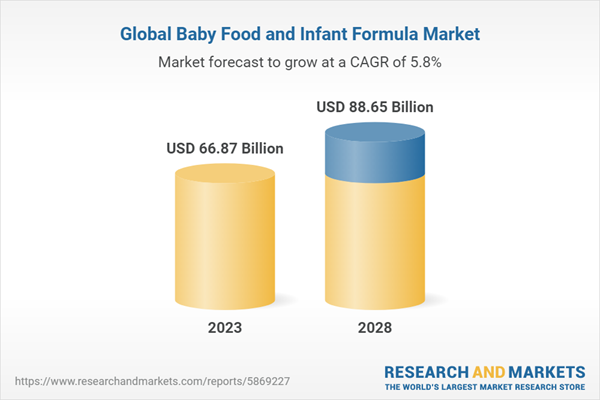Baby food and infant formula, essential components of modern childcare, are specifically crafted products that cater to the nutritional requisites of infants and toddlers. These products are designed to serve as supplementary or alternative nourishment sources, filling any potential dietary gaps and ensuring robust growth and development during the pivotal early years of life. Ranging from milk-based formulations to pureed foods, they are the cornerstone of ensuring balanced nutrition for many infants globally.
Central to the upswing in the baby food and infant formula market growth is the paradigm shift in parenting methodologies and increasing consumer confidence in commercial dietary solutions for infants. This confidence stems from rigorous quality controls, research-backed nutritional formulations, and transparent ingredient sourcing processes maintained by industry players. As parents, especially those in urban locales, grapple with time constraints and seek efficient solutions, these products emerge as trusted allies.
Furthermore, advancing maternal workforce participation rates globally have pivoted infant formula and prepared baby foods from luxury to necessity. Many working mothers, despite understanding the unparalleled benefits of breastfeeding, might face challenges in exclusively nursing their infants due to professional commitments. In such instances, premium infant formulas, positioned as proximate to breast milk composition, find heightened acceptance.
Adding momentum to the baby food and infant formula market expansion is the burgeoning awareness of infant nutritional needs and the significance of fostering a diversified palate from an early age. Today's parents are well-informed, often consulting paediatric nutritionists, to ascertain the best dietary path for their children. Armed with this knowledge, they are increasingly reaching out for fortified cereals, vegetable and fruit purees, and protein-rich preparations to ensure their child’s comprehensive growth.
On the technological front, innovations in food processing and preservation methodologies have paved the way for a wider spectrum of baby food products, many with extended shelf lives and enhanced nutrient retention. From freeze-drying techniques to cold-pressed methods, modern baby foods strive to offer the freshest flavours and utmost nutritional value.
Moreover, the baby food and infant formula market demand are likely to be influenced by the surging demand for organic and natural baby food solutions. Eco-conscious and health-centric parenting ideologies are rapidly gaining traction, leading to an amplified demand for products free from synthetic additives, pesticides, and genetically modified ingredients. This organic wave is not merely a fleeting trend but a testament to the deeper global shift towards sustainable and health-conscious consumption patterns.
Market Segmentation
The market can be divided based on type, distribution channel, and region.Market Breakup by Type
- Milk Formula
- Dried Baby Food
- Prepared Baby Food
- Others
Market Breakup by Distribution Channel
- Supermarkets and Hypermarkets
- Pharmacies
- Convenience Stores
- Others
Market Breakup by Region
- North America
- Europe
- Asia Pacific
- Latin America
- Middle East and Africa
Competitive Landscape
The report looks into the market shares, plant turnarounds, capacities, investments, and mergers and acquisitions, among other major developments, of the leading companies operating in the global baby food and infant formula market. Some of the major players explored in the report are as follows:- Abbott Nutrition
- Nestlé S.A.
- Danone S.A.
- Mead Johnson & Company, LLC
- Others
About the Publisher
Acquire unparalleled access to critical industry insights with our comprehensive market research reports, meticulously prepared by a team of seasoned experts. These reports are designed to equip decision-makers with an in-depth understanding of prevailing market trends, competitive landscapes, and growth opportunities.Our high-quality, data-driven analyses provide the essential framework for organisations seeking to make informed and strategic decisions in an increasingly complex and rapidly evolving business environment. By investing in our market research reports, you can ensure your organisation remains agile, proactive, and poised for success in today's competitive market.
Don't miss the opportunity to elevate your business intelligence and fortify your strategic planning. Secure your organisation's future success by acquiring one of these reports today.
*The publisher always strives to provide you with the latest information. The numbers in the article are only indicative and may be different from the actual report.
Table of Contents
Companies Mentioned
- Abbott Nutrition
- Nestlé S.A.
- Danone S.A.
- Mead Johnson & Company, LLC
Table Information
| Report Attribute | Details |
|---|---|
| No. of Pages | 180 |
| Published | August 2023 |
| Forecast Period | 2023 - 2028 |
| Estimated Market Value ( USD | $ 66.87 Billion |
| Forecasted Market Value ( USD | $ 88.65 Billion |
| Compound Annual Growth Rate | 5.8% |
| Regions Covered | Global |
| No. of Companies Mentioned | 4 |









